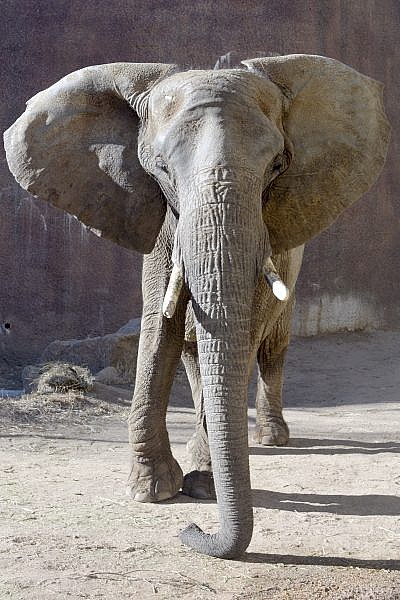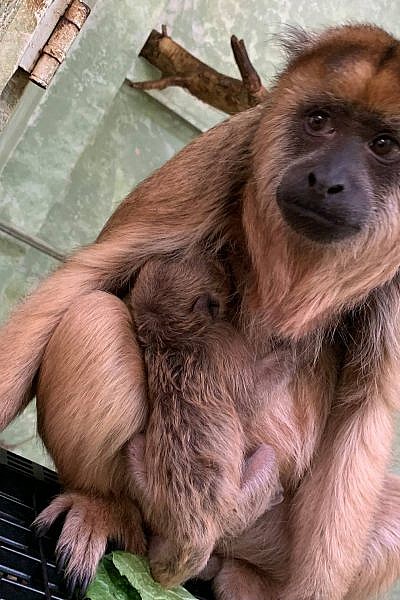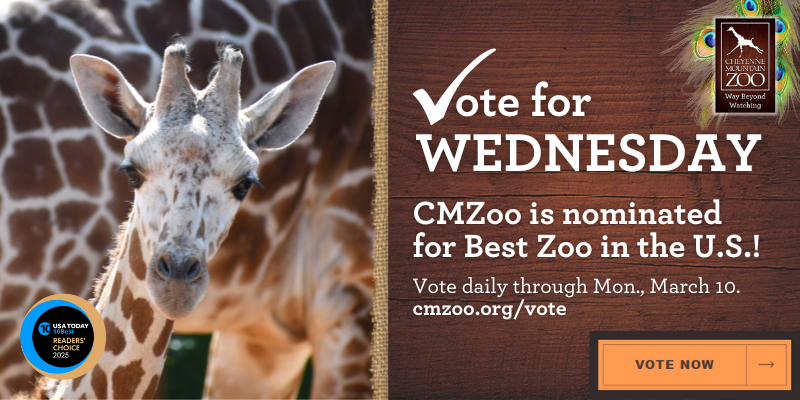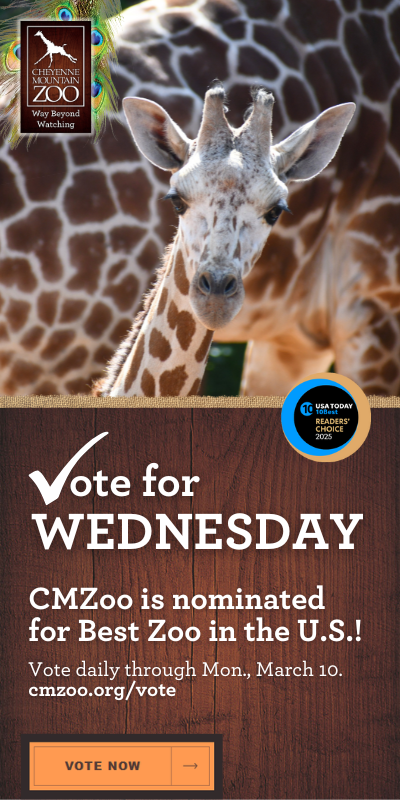–Annual holiday lights celebration continues through Tuesday, Jan. 1–
December 21, 2018, Colorado Springs, CO – USA TODAY 10Best Readers’ Choice Awards today announced that Cheyenne Mountain Zoo has been voted No. 5 in the nation in the Best Zoo Lights category. This is the third year running that CMZoo has ranked in the top ten.
The award-winning annual holiday lights celebration continues through Tuesday, Jan. 1 (except Christmas Eve, Tuesday, Dec. 24), featuring 85 one-of-a-kind light sculptures, 50 acres of twinkling lights, animal demonstrations and interactive activities, and a breathtaking nighttime view of Colorado Springs from Cheyenne Mountain. Animal keeper talks, enrichment activities, shows and animal encounters occur every night.
ANIMAL HAPPENINGS SCHEDULE
Mondays
6:30 p.m. – Otter Enrichment (Rocky Mountain Wild)
7:30 p.m. – Skunk Enrichment (The Loft)
Tuesdays
6:30 p.m. – African Lion Keeper Talk (African Rift Valley)
7:30 p.m. – Bird Show (The Loft)
Wednesdays
6:30 p.m. – Elephant Keeper Talk (Encounter Africa)
7:30 p.m. – Skunk Enrichment (The Loft)
Thursdays
6:30 p.m. – African Lion Keeper Talk (African Rift Valley)
7:30 p.m. – Bird Show (The Loft)
Fridays
6 p.m. – Amur Tiger Enrichment (Asian Highlands)
7 p.m. – Skunk Enrichment (The Loft)
8 p.m. – Coati Enrichment (Monkey Pavilion)
Saturdays
6 p.m. – Reptile Encounter (Scutes Family Gallery)
7 p.m. – Bird Show (The Loft)
8 p.m. – African Lion Keeper Talk (Monkey Pavilion)
Sundays
6 p.m. – Elephant Keeper Talk (Encounter Africa)
7 p.m. – Mountain Lion Enrichment (Rocky Mountain Wild)
8 p.m. – Moose Keeper Talk (Rocky Mountain Wild)
In addition to scheduled animal happenings, Electric Safari offers paid feeding opportunities with our famous giraffe herd and our budgie flock, and visits to the elephant barn, Encounter Africa, Rocky Mountain Wild (except grizzly bears and wolves), Asian Highlands, Monkey Pavilion, Scutes Family Gallery and Australia Walkabout.
Grizzly Grill, The Overlook, Elson’s Place and Pizza with a View will be open each night to serve food and beverages. Fire pits and outdoor heaters throughout the Zoo add to the unique experience and help keep visitors warm in between the indoor animal exhibits.
Members and their accompanying paying guests are granted early admission at 4:30 p.m. General admission is from 5:30 p.m. to 8:30 p.m. with the final admission at 7:30 p.m. Attendance is free for Zoo members. The general public can save $2 per ticket by purchasing them no later than 3 p.m. the day they plan to attend. Tickets are available at cmzoo.org/electric.
Attendees will enjoy more than 50 acres of lit trees, structures and animated sculptures installed by the Cheyenne Mountain Zoo horticulture, grounds and maintenance teams over four months of Electric Safari preparation.
If all of those animal interactions and beautiful lights don’t un-Scrooge even the Grinchiest of holiday grumps, a cup of hot cocoa and a visit with Santa and Mrs. Claus ought to do the trick. Kris Kringle and his jolly lady will be in Safari Lodge through Sunday, Dec. 23 to hear holiday wishes, collect lists and pose for free photos. The carousel and historic Mountaineer Sky Ride will be open (weather permitting) to provide incredible once-a-year views of the nighttime glow of Colorado Springs as a backdrop from the mountainside of twinkling lights.
ELECTRIC SAFARI FAST FACTS
DATES: Every night through Tuesday, Jan. 1, 2019*
(*Electric Safari is not open on Christmas Eve, Dec. 24.)
Santa and Mrs. Claus visits through Sunday, Dec. 23
TIME: 5:30 – 8:30 p.m. nightly (last admission at 7:30 p.m.)
Early admission at 4:30 p.m. for Zoo members and their paying accompanying guests
COST: FREE for Zoo Members
Online Non-Member Prices
Adult (ages 12-64): $12.75
Child (ages 3-11): $8.75
Military adult: $9.75
Military child: $5.75
Senior (65+): $10.75
Ages 2 and under: 75¢
Gate Non-Member Prices
Adult (ages 12-64): $14.75
Child (ages 3-11): $10.75
Military adult $11.75
Military child: $7.75
Senior (65+): $12.75
Ages 2 and under: 75¢
Electric Safari is sponsored by Children’s Hospital Colorado and your Colorado Springs Toyota dealers.
For more information, visit: www.cmzoo.org/electric.
(Photos and videos for media use are available here. Please credit Cheyenne Mountain Zoo.)
About Cheyenne Mountain Zoo
Cheyenne Mountain Zoological Society was founded in 1926. Today, Cheyenne Mountain Zoo, America’s only mountain zoo, offers comprehensive education programs, exciting conservation efforts and truly fantastic animal experiences. It is Cheyenne Mountain Zoo’s hope that guests fall in love with animals and nature, and take action to protect them. Of the 233 zoos and aquariums accredited by the Association of Zoos and Aquariums (AZA), Cheyenne Mountain Zoo is one of just ten operating without tax support. Cheyenne Mountain Zoo depends on admissions, membership dues, special event attendance and donations for funding.




